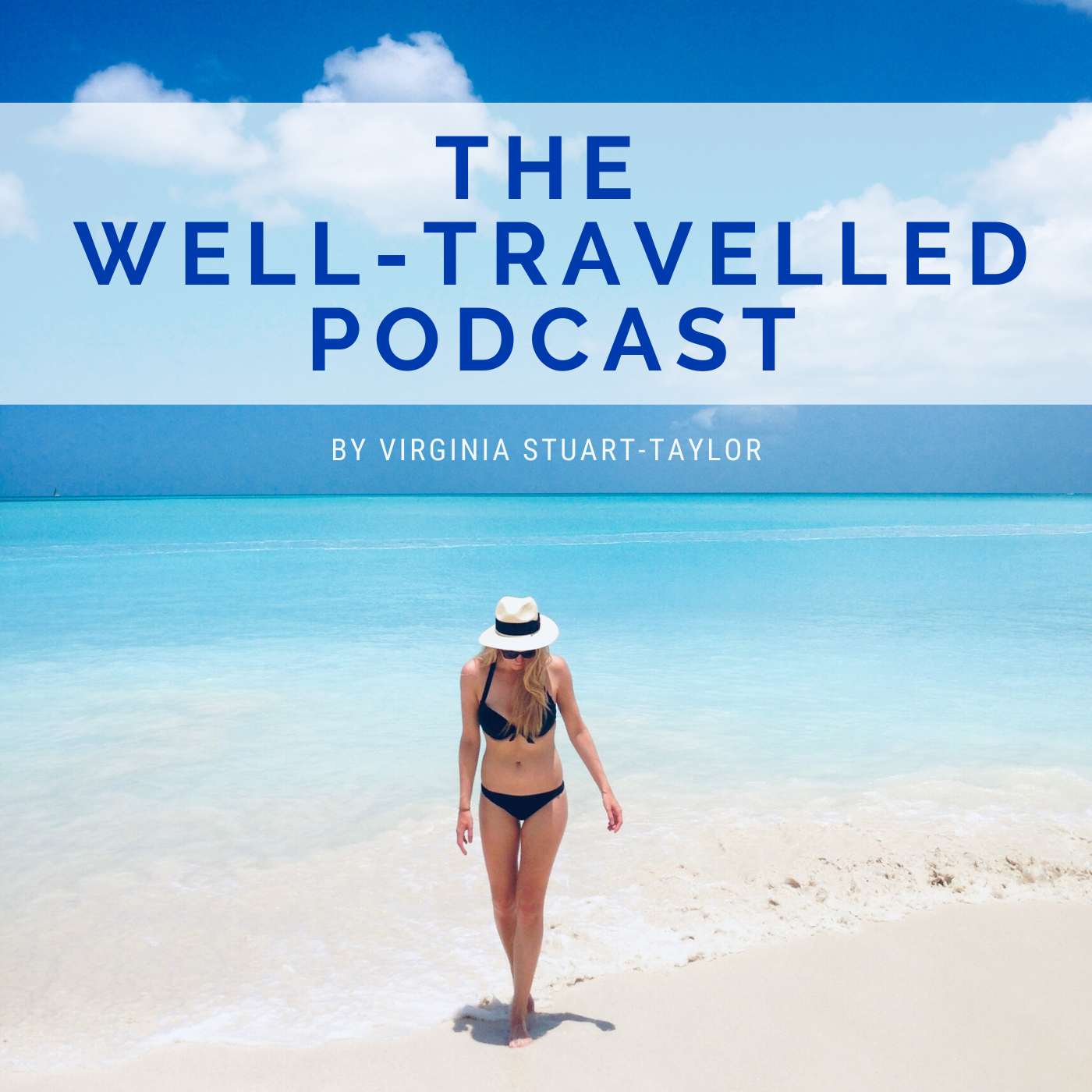My Thoughts on Why We Feel Compelled To Travel, and the Changing Meaning of Travel
If you’re a fan of listening to podcasts, then you can also listen to this blog post about why we feel compelled to travel in this episode of The Well-Travelled Podcast.
Why do we feel compelled to travel? If you ask any adult in Britain what their passions are, the vast majority will include travel among their list of passions. Who doesn’t love to travel? I’m presuming that you yourself also feel compelled to travel and that you dream of far-off places from time to time, or else you probably wouldn’t be reading this blog post. But why are we all so addicted to travel? Why do we save up our precious earnings for months to afford long-haul flights and why do we count down the days until our next holiday? (If you don’t already have it, then you’ll love the app Countdown+.)
The Wanderlust Gene?
You might have seen the many reports earlier this year that scientists have discovered a ‘wanderlust gene‘ that supposedly explains why certain people can’t sit still, why they were born to roam the planet in search of novelty and adventure. This discovery throws up an interesting question: is a passion for travel a question of nature or nurture? Is it societal influences and the marketers of the mammoth travel industry that impose this desire to travel on us, or is it a genetic characteristic that runs through family trees? What do you think?
Clever travel marketing? Bucket lists? FOMO?
Can I really claim that my passion for travel simply courses through my veins and that I remain impervious to advertising? I can’t deny that I succumb to a clever marketing campaign as much as the next person, adding a country to my wishlist after seeing a single stunning video or after reading an excellent article on a particular destination. Am I influenced by the travels of my peer group and the expectations of society? Of course I am. As much as we all hate to admit that we’re a product of our surroundings, a ‘sheep’ even, it’s the truth! I’d like to think that I do break out of a certain mould, but I’m aware that my travel wishlist comprises a few items that I’ve probably picked up from other people. The perfect example is no.11, an elusive trip to Ibiza that I’ve been trying to organise for a few years. I’m sure I’d live happily ever after if I never visited that particular island in the Mediterranean (I’ve spent enough time in the Mediterranean already) but I know that “doing Ibiza” is something everyone my age raves about, so I too am dying to “do Ibiza”! Here’s a classic case of FOMO (fear of missing out) at play, shaping our aspirations and identifying our generation as one that doesn’t want to be left out of anything. The phenomenon of bucket lists is another perfect example of this. The experiences on our bucket lists have mostly been poached from Buzzfeed ‘listicles’, various bloggers’ bucket lists and (of course) our Facebook News Feeds. Yes they are all individual and I doubt that my bucket list is absolutely identical to anyone else’s, but it is definitely influenced by the travels of others around me.
The rise of experiences over material possessions – the new social capital?
So why do so many of us feel compelled to travel, as opposed to any other hobby, like playing a musical instrument or shopping? Our generation of “millennials” are noticeably more driven by experiences than by material possessions, which was a characteristic of the generation before us. We’re spending more and more money on experiences and travel than ever before, and the new “material possessions” of our generation can be deduced from the motto: “If you didn’t get a picture, then it didn’t happen”. Look at the meteoric rise in popularity of GoPro cameras! Every Jack and Jill (including me!) is recording and snapping their exploits and adventures, and a person’s enviable Instagram feed or their beautifully curated Facebook photo album is the new social capital, replacing the latest Prada handbag or sports car which would have previously been the main aspirations of Generation X before us. It’s a fascinating societal shift, and a good one in my mind! Travel is after all “the only thing you buy which makes you richer”. When I meet someone new for example, I am far more interested in finding out where they have travelled to and what they like to do, rather than checking out what brands they’re wearing. We’re choosing to collect memories rather than materialistic objects and I think it’s fantastic!
So what else compels us to travel? Surely the influences I’ve mentioned above only apply to me or to people very similar to me in age, gender, background, location and education. What about the way travel has changed in meaning for me throughout my life? I haven’t always thought about travel in the way that I do now.
The lifecycle of a traveller
Everyone’s travel bio is different and will have lead them to a different relationship with travel, but I’ll try and give a pretty standard example of the lifecycle of a traveller:
- 0 – 5 years: Until a child is 5 or so, they might not travel abroad if their parents go on grown-up holidays without them and deposit the children with grandparents.
- 5 – 10 years: Then the child will probably start travelling a few times a year to nearby countries – typically France if they grew up in the UK. They might spend a week skiing and a week on the coast. I was lucky to grow up with a little family bungalow in France, where I spent the rest of my summers until about aged 10.
- 10 – 18 years: At this point the parents are starting to consider more cultural holidays, thinking that said child is now going to remember these trips, so they might venture further afield during the teenage years. There are probably a couple of school trips abroad, a language exchange or a sports tour, and then said person hits 18 and leaves school.
- 18 – 19 years: Let’s imagine this person takes a gap year and backpacks around South America or South East Asia, or inter-rails around Europe on a shoestring.
- 19 – 22 years: Studying at University will involve some very budget weekend trips to cities like Amsterdam and Prague, and some festivals around Europe, mixed in with some much nicer, more sophisticated family holidays outside of term time. Not everyone will have this, but said person might also do a Third Year Abroad, studying/working/teaching abroad, probably again on a shoestring but at least living in one place for several months and integrating into local life, while travelling around Europe as much as possible at weekends, and relishing the crazy experience that is Erasmus.
- 23 – 30 years: After university said person will probably move to a city like London to find work, and if they’re lucky they’ll start to enjoy the world of business travel: airport lounges, expenses and 5* hotels. Even if they don’t travel for work, they’re not going to give up travelling. On the one hand they’ve finally got some disposable income to spend on more upmarket travel, but on the other hand they’re also juggling finite annual leave and the challenges of organising holidays around everyone’s busy schedules. But if they’re in that millennial age bracket, then they probably have several friends who have moved abroad to big international cities like San Francisco, New York, Sydney, Dubai, Singapore & Hong Kong, so they might have those itchy feet in the background. Any of this sound familiar?
The interesting thing to me is that this person’s travel tastes have changed dramatically over the years, more probably than their taste in food, their taste in music, their fashion sense or their personality have changed. Do you agree? I find the lifecycle of a traveller phenomenonly interesting. A backpacker who swore an oath of allegiance to the hostel way-of-life in 2011 could, just a few years later, find themselves flying in business class for work and staying in boutique hotels on weekend city breaks, dining in Michelin-star restaurants…
And why this drastic shift you ask? Easy. A hard-working-rush-hour-commuter-desk-slave doesn’t have the energy to then pick up a backpack and slum it for a long weekend or 1-week holiday. They want a rest and deserve a treat for slaving away in suit and tie, so they develop a taste for the finer establishments. And that timeline above only extends until their early-thirties…
- 30 – 40 years: Then the whole cycle begins again with toddler staycations or family holidays to nearby countries, sticking to child-friendly but usually culture-free locations. Suddenly this person is no long paying for just themselves, they’re paying for a whole family’s flights, so the budget shrinks.
- 40 – 50 years: Once the children’s ages reach double digits, this person’s family holidays get a bit more exciting again, venturing slightly further long-haul, being active skiing and sailing, and holidaying with friends. The trips also probably start costing an arm and a leg!
- 50+ years: The children have finally flown the nest and this person can start taking more luxurious trips abroad, even travelling for weeks or months at a time once they retire, and their plans may well start to revolve entirely around their travels. They might even emigrate to a sunny beach or buy a second home.
Having not reached any of the last three life stages, I don’t know how accurate they are or how much I can comment. However I’d like to think of myself as being an adventurous mother who takes her children all over the world, showing them beauty and ugliness, poverty and wealth, natural landscapes and huge cities, hostels and luxury hotels, giving them as broad a view of the world as possible. Did you ever bump into a young western family in a hostel in a developing country? I always thought they looked like the coolest families, and I envied those children for the life skills they were developing at such a young age. 
Motivations for travel and where I am right now
In each of those life stages, our motivations for travel are different – whether it be to learn a new skill on a school trip, to go through a rite of passage by backpacking for months on end, to make roots in a different culture by living abroad, to experience the good life in luxurious establishments, to relax and detox from work, to go wild with friends and leave inhibitions at home at festivals, to experience somewhere new and expand your horizons just because you can. As I’m only in my mid-twenties, I am yet to experience all of those life stages. But I would have thought that at one point or another in my 26 years, my passion for travel would have diminished, as I discovered other interests/distractions and took on travel-inhibiting commitments such as working full-time. I often wish that my passion would actually take a break, so I could be truly happy and satisfied with where I am right now, living in the present instead of eternally dreaming and plotting my future travels.
Right now in particular, I’m in that life stage where I’m squeezing as much travel as possible into my 31.5 days of annual leave, while secretly envying everyone who is living abroad and quenching that thirst for travel. But I also happen to live in London, one of the coolest cities on the planet, where the majority of my friends also happen to be, and we’re enjoying a pretty damn good summer at the moment! I am perfectly happy here for the time being, while the sun is shining and I have a particular distraction to keep me busy, but I think my anxiety stems from the anticipation of the winter to come. Yet another bitter winter in London is simply not something my mind likes to entertain!
1 Year in London and What’s Next?
This week marks 1 year since I moved from Madrid back to London (scary thought!) and I can’t ignore this overriding feeling that it’s time for another change of scenery! The allure of elsewhere is calling once again… Will I ever conquer my short-termism and feel content to stay put somewhere for longer than my current record of 18 months? If others have succeeded in appreciating the here-and-now, then please do pass on your tips!
Which stage of the traveller’s lifecycle are you in and what compels you to travel? Has the meaning of travel changed for you? And what’s your “what next” – do you have any exciting plans ahead?
__________________















Great post! I often find myself wondering the same thing.
LikeLike
Thanks!
LikeLike
Good post, definitely interesting.. Although I think your “travel cycle” might be flawed, you should take into consideration the people who grew up without well-off parents.. And not being able to take trips or travel,especially abroad. I think that’s also a big factor in some people’s relationships with traveling. Really interesting subject though.
LikeLike
Yes that’s a very good point, and perhaps I was lucky to travel more than most. But to illustrate the point I tried to use as many examples as possible, I realise that doesn’t reflect everyone’s travel bio. Cost used to be a real issue but to be honest it’s now sometimes cheaper to fly abroad to a cheap hotel than to stay in the UK for a holiday, so that’s definitely democratising travel as well.
LikeLiked by 1 person
Definitely in the 20s stage, where we’ve all but entirely given up on hostels (there really is something to be said for your own shower!) but still try to travel on a bit of a budget. I read an article recently on how travel photos are the new status symbol (as opposed to purses haha) which is another reason that drives a lot of people. Great post!
LikeLike
Completely agree about communal showers! Ok for brief trips but not appealing for anything more than a few days haha!
LikeLiked by 1 person
This is great. I also think it’s possible to be in ‘travel age categories’ in the wrong order, like a late gap year for instance.
LikeLike
Yep definitely, taking sabbaticals at different ages, which I think still has a bit of stigma attached to it unfortunately but which I think is becoming more and more the norm – which is fantastic.
LikeLike
You’ve presented many interesting things to think about! I’m in the sparsely populated group of folks who are 50+ but still have kids young enough to consider in my travels. I, too, have the wanderlust gene and love a change of scenery as often as possible. You’ll know when it’s really time for a change… Enjoy this time in your life!
LikeLike
Thanks, glad you liked the article!
LikeLike
I can vouch for the arm and leg category of travelling with teens but the joy of seeing them experience another culture, language and activities makes it worth every cent. This is why I now travel… to watch them enjoy what I have always loved!
LikeLike
That’s such a wonderful sentiment, I hadn’t ever thought of that! I’m at a life stage where anything related to kids or teenagers just sounds like hassle, but of course it must be great to see them learning and experiencing a new place. Thanks for commenting, I really like your point 🙂
LikeLiked by 1 person